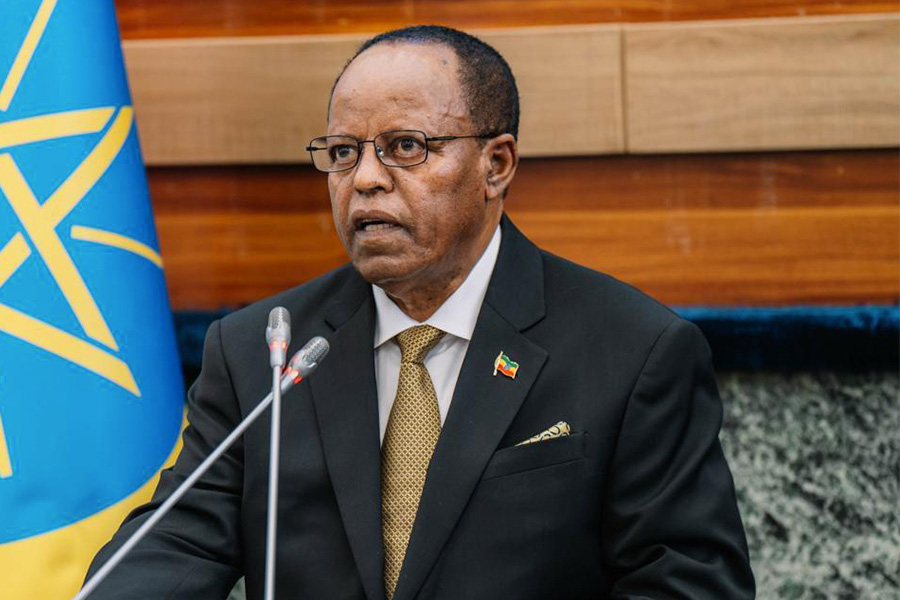
Jun 18 , 2022
 The National Disaster Risk Management Commission procured six million quintals of wheat for displaced and drought-stricken citizens. The wheat will be transported by six transporter associations to eight warehouses in different regions.
The National Disaster Risk Management Commission procured six million quintals of wheat for displaced and drought-stricken citizens. The wheat will be transported by six transporter associations to eight warehouses in different regions. Six cross-border transporter associations offered a combined lowest price of slightly over 805.4 million Br to transport six million quintals of wheat from Djibouti Port to eight warehouses in various parts of the country.
The six companies placed the lowest offers out of 19 companies that submitted their financial and technical offers during the bid opening held on July 25, 2019.
The National Disaster Risk Management Commission, which procured the wheat for four billion Br for the internally displaced and drought-stricken citizens, floated the tender at the beginning of this month. A total of 23 companies bought the bidding document.
Agrocorp International Pte Ltd won the tender to supply five million quintals, while Gemcorp Capital won the bid to supply the remaining one million quintals.
To transport the commodity, 19 companies submitted bids, with ten vying for all eight destinations and one company placing offers for five. Three transporters bid for four destinations; two transporters for three; and the remaining three transporters competed for two destinations.
Haile Tesfakiros Cross Borders Transport S.C offered the lowest price of 138 Br a quintal to carry two million quintals of wheat from Djibouti to Adama.
Horu Cross Borders Transport S.C placed the lowest price of 115 Br and 125 Br a quintal to transport nearly 1.1 million quintals and 800,000 quintals of wheat to warehouses in Kombolcha and Meqelle, respectively.
To transport 300,000 quintals of wheat to Shinile, Jet Cross Borders Transport quoted 96.95 Br a quintal. It also offered 94.8 Br a quintal to carry 200,000 quintals of wheat to Dire Dawa.
Dejen Cross Borders Transport placed the lowest offer to transport one lot to Shashemene. The company proposed 145 Br a quintal to transport 350,000 quintals to Shashemene.
Tikur Abay Transport Plc offered 150 Br a quintal to transport 0.7 million quintals to Woreta.
Semen Cross Borders Transport S.C placed 175 Br a quintal for 600,000 quintals of wheat destined for Wolaita.
The financial readout is not final unless documentation provided by the companies are full and up to date as per the requirement of the bid document, according to Meseret Berhane, marketing and supply team leader at the Commission and chairperson of the bidding committee.
"The announcement of the final results depends on the response of the bidders in fulfilling their documents," she said.
Due to the shortage of trucks, the price offered by the companies is higher than normal, according to Salahadin Khalifa, board chairperson of Ethiopian Freight Forwarders & Shipping Agents Association.
"The transportation fee has increased by 50pc," said Salahadin.
Over the past three months, there is a shortage of trucks due to the mass transportation of fertiliser by the government. Thus, importers have faced a challenge to get trucks to transport commodities.
"The number of carriers can't cope with the developmental needs of the country," said Salahadin.
However, the Ministry of Transport argues the opposite.
"This time, the transportation will go smoothly, prioritising consumer goods," said Endalkachew Tsegaye, communications affairs director at the Ministry, which formed the National Transport Committee to oversee the logistics of the commodity.
Tesfaye Melaku, an economist at Bahir Dar University, said inefficiency of government procedures has more impact on delaying the transportation of the items than the shortage of trucks.
"Planning problems and the inefficient procurement laws of the country are the major flaws," he said.
Once the bidding process is completed, the winning companies are expected to transport the wheat before October. The Commission plans to ferry 80,000ql to 120,000ql of wheat a day by deploying 200 to 300 trucks with a loading capacity of 400ql a day.
Upon arrival, nearly two-thirds of the wheat will be distributed to the approximately 8.5 million people affected by drought and displacement, while the remaining two million quintals of wheat will be held in reserve in the eight warehouses.
Currently, the transportation of 200,000 quintals of wheat from Djibouti Port, financed by the government and facilitated by the World Food Programme, has begun. So far, around 60,000ql have arrived inland.
PUBLISHED ON
Jun 18,2022 [ VOL
23 , NO
1155]

Fortune News | Jul 03,2021

Agenda | Jul 13,2025

Radar | Nov 07,2020

Radar | Oct 12,2019

Radar | May 23,2020

Dec 22 , 2024 . By TIZITA SHEWAFERAW
Charged with transforming colossal state-owned enterprises into modern and competitiv...

Aug 18 , 2024 . By AKSAH ITALO
Although predictable Yonas Zerihun's job in the ride-hailing service is not immune to...

Jul 28 , 2024 . By TIZITA SHEWAFERAW
Unhabitual, perhaps too many, Samuel Gebreyohannes, 38, used to occasionally enjoy a couple of beers at breakfast. However, he recently swit...

Jul 13 , 2024 . By AKSAH ITALO
Investors who rely on tractors, trucks, and field vehicles for commuting, transporting commodities, and f...

Oct 4 , 2025
Eyob Tekalegn (PhD) had been in the Governor's chair for only weeks when, on Septembe...

Sep 27 , 2025
Four years into an experiment with “shock therapy” in education, the national moo...

Sep 20 , 2025
Getachew Reda's return to the national stage was always going to stir attention. Once...

Sep 13 , 2025
At its launch in Nairobi two years ago, the Africa Climate Summit was billed as the f...